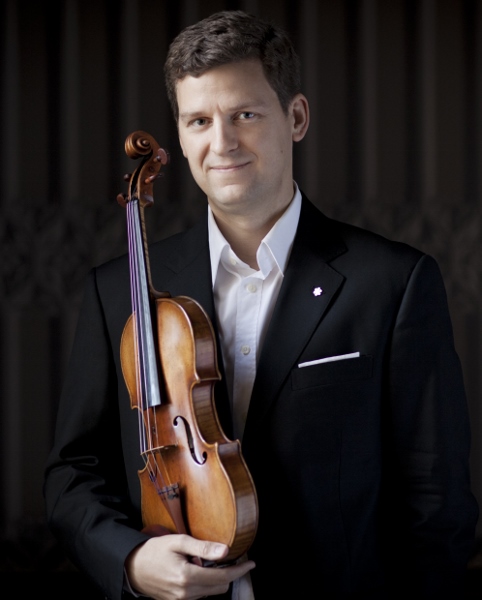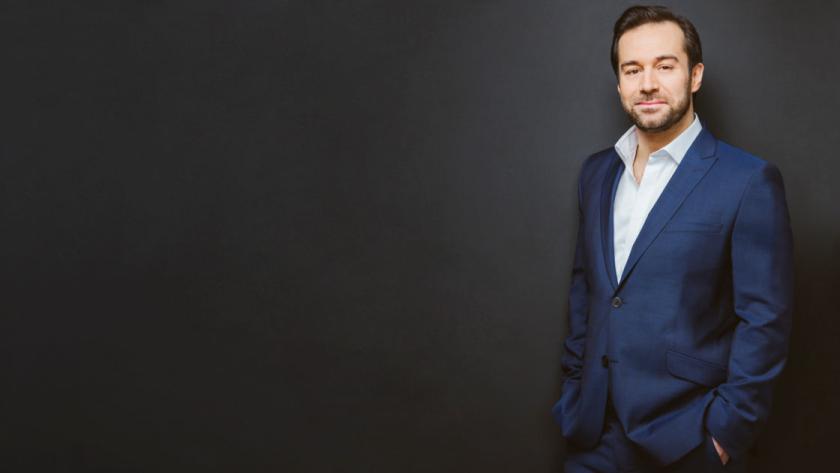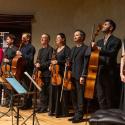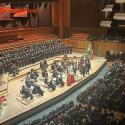Changes from the artists originally advertised can bring some happy discoveries. Sir Mark Elder, though present in the audience to hear last night’s Hallé performance at the Bridgewater Hall, was still recovering from surgery and so did not conduct it, as he’d planned to when the season was announced. Instead, the Hallé Youth Orchestra’s music director (and noted choral director) Ellie Slorach took the baton for the first work in the programme – Weinberg’s Rhapsody on Moldavian Themes.
This is Weinberg’s centenary year, so relative rareties such as this pleasant concoction of folk themes are being heard. It’s got the relaxed and dance-like quality of its musical origins (Chișinău, the capital of Moldova today, is the only place I’ve ever visited where people spontaneously dance to bands in the public parks of a weekend afternoon). The impressive thing here was Ellie Slorach’s command of the orchestra’s playing. In the slow, atmospheric opening of the piece string pizzicati were absolutely unanimous, the tunes swayed in folksy style, the metrical changes were deftly handled, and there was neatness and clarity throughout.
The remainder of the concert was conducted by Fabien Gabel, music director of the Orchestre Symphonique de Québec and the French national youth orchestra, and a former Donatella Flick competition winner. His first task was accompanying James Ehnes (pictured below) in Britten’s Violin Concerto. Ehnes is probably incapable of giving a poor performance of anything, and from the soulful announcement of the opening theme he had his audience’s attention on the progress of this deeply uneasy, wartime work. He and Gabel gave an unearthly lilt to the sort of slow flamenco rhythm that follows that opening – the second movement started spiky and urgent and kept moving briskly.
 The orchestral contribution to the climax that follows was intense, as it was to that of the Passacaglia finale, and Ehnes was in complete control of the long and virtuosic Cadenza – almost a movement in itself – that introduces it. He offered a peerless example of violin magic in his solo encore: the third movement of Bach’s Sonata no. 2 sounding almost as if played by two violins, so contrasted were the sounds of solo and accompaniment and so compelling the rhythmic flow despite the double-stopped chords.
The orchestral contribution to the climax that follows was intense, as it was to that of the Passacaglia finale, and Ehnes was in complete control of the long and virtuosic Cadenza – almost a movement in itself – that introduces it. He offered a peerless example of violin magic in his solo encore: the third movement of Bach’s Sonata no. 2 sounding almost as if played by two violins, so contrasted were the sounds of solo and accompaniment and so compelling the rhythmic flow despite the double-stopped chords.
Gabel had Tchaikovsky’s Fourth Symphony to complete his assignment. This was a thing of two halves really: the first being the opening and second movement: all depression and melancholy (he clearly knew the balance and impetus he wanted to find every single bar), with a big pause after the "fate" theme had first run its course giving gravity to everything that followed. It was anything but routine Tchaikovsky – refreshingly different and a musical exposition in every way.
The stringendo passage that follows the beautiful second theme each time it appears can be a bit of a danger zone. In this performance it did not begin too soon – indeed the playing seemed quite laid back at the outset – but when it began it was perceptible and eventually inexorable.The "canzona" of the second movement also had a deliberate pace and Gabel brought a rich Russian sound from the big string team fielded by the Hallé for its Thursday series concerts, with woodwind counterpoints beautifully articulated.
Then everything changed: depression switched to elation. The scherzo was taken at a terrific lick, vigorous and disciplined in the strings’ pizzicati, incisive in the brass, and of course almost impossible for the piccolo (though Joanne Boddington got through with flying colours).And with so much excitement built, the finale could not but be fast and furious, verging on the hysterical. Gabel pressed the tempo still more in the coda and even the final bar – and that kind of finish always goes down well.














Add comment